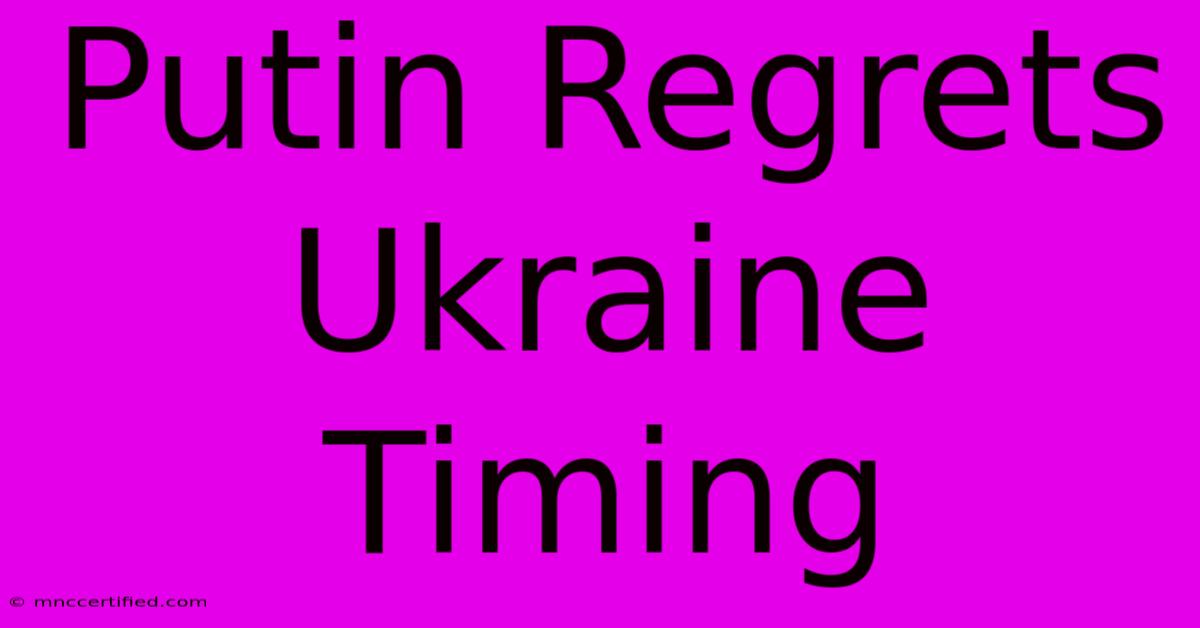Putin Regrets Ukraine Timing

Table of Contents
Putin Regrets Ukraine Timing: A Deeper Dive into the War's Strategic Miscalculations
Vladimir Putin's invasion of Ukraine, launched in February 2022, has been widely condemned as a catastrophic miscalculation. While the Kremlin's official narrative remains steadfast, mounting evidence suggests that Putin himself may be experiencing significant second thoughts about the timing and execution of his military operation. This article explores the potential reasons behind this alleged regret, examining the strategic blunders, underestimated resistance, and unforeseen consequences that have plagued the Russian war effort.
The Shifting Sands of Strategic Miscalculation
The initial justification for the invasion rested on several assumptions, all of which have proven demonstrably false. Putin likely underestimated:
-
Ukrainian Resistance: The ferocity and resilience of the Ukrainian military and civilian population caught Russia completely off guard. The expectation of a swift, decisive victory was shattered by staunch resistance, leading to protracted and costly conflict. This underestimation of Ukrainian resolve is arguably Putin's biggest strategic error.
-
International Condemnation: The scale and intensity of international sanctions imposed on Russia were far beyond initial predictions. The unified response from NATO and the West, including significant military and financial aid to Ukraine, severely hampered Russia's economic stability and military capabilities. This failure to anticipate the global response significantly impacted Russia's strategic goals.
-
Western Weaponry's Effectiveness: The advanced weaponry supplied to Ukraine, including anti-tank and anti-aircraft systems, proved remarkably effective in neutralizing Russian armored columns and air power. The effectiveness of these weapons, combined with Ukrainian tactical prowess, dramatically altered the battlefield dynamics. This underestimation of Western military support directly contributed to Russia's stalled advance and mounting casualties.
The Economic Toll and Domestic Pressure
Beyond the military setbacks, the war has inflicted a heavy economic toll on Russia. Sanctions have crippled key sectors of the Russian economy, leading to inflation, capital flight, and a decline in living standards. While the Kremlin attempts to portray an image of resilience, the economic strain is undeniable and likely contributes to Putin's perceived regret. The increasing economic hardship could be fueling domestic pressure and raising concerns about long-term stability.
The Shifting Narrative and Signs of Regret
While direct evidence of Putin's personal regret is scarce and largely circumstantial, several factors suggest a potential shift in his thinking:
-
Escalation Avoidance: Recent rhetoric from the Kremlin has emphasized a cautious approach, avoiding further escalation. This contrasts with earlier, more belligerent pronouncements.
-
Shifting Military Objectives: The initial goal of regime change in Kyiv has been quietly abandoned, replaced by a focus on securing territorial gains in eastern and southern Ukraine. This shift reflects a pragmatic acknowledgment of the limitations of Russia's military capabilities.
-
Increased reliance on Wagner Group: The growing reliance on the Wagner Group, a private military company known for its brutality and lack of accountability, indicates a potential acknowledgment of shortcomings within the regular Russian army.
The Long-Term Implications
The war in Ukraine represents a watershed moment in Russian history and global geopolitics. Regardless of Putin's private feelings, the long-term implications of his decision are far-reaching and likely to shape the international landscape for years to come. The consequences of the invasion, including the devastating humanitarian crisis, the increased global instability, and the erosion of international norms, are profound and enduring.
Conclusion: A Costly Miscalculation
While conclusive proof of Putin's regret remains elusive, the evidence strongly suggests a significant recalibration of Russian strategy and objectives. The war in Ukraine has exposed critical flaws in Russia's military planning and intelligence, as well as a fundamental misjudgment of both Ukrainian resilience and the international response. The long-term consequences of this costly miscalculation are still unfolding, but one thing is clear: the invasion of Ukraine represents a turning point, not only for Russia but for the global order. The question now becomes: how will Putin and Russia adapt to the unforeseen challenges and consequences of this strategic blunder? The answer will shape the future of Europe and the world.

Thank you for visiting our website wich cover about Putin Regrets Ukraine Timing. We hope the information provided has been useful to you. Feel free to contact us if you have any questions or need further assistance. See you next time and dont miss to bookmark.
Featured Posts
-
Should You Fear A Stock Market Crash
Dec 20, 2024
-
Warriors Lose To Grizzlies Curry Without Fg
Dec 20, 2024
-
Fulton Da Willis Removed From Prosecution
Dec 20, 2024
-
Karen Hugers Dui Lawyer Responds
Dec 20, 2024
-
Rhops Karen Huger Dui Conviction
Dec 20, 2024